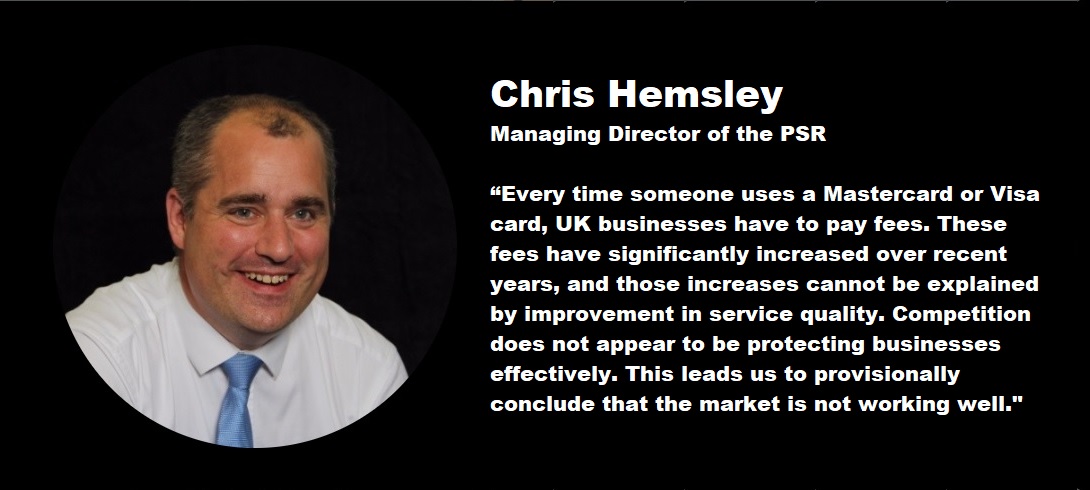
The UK regulator’s interim report suggests the supply of scheme and processing services is not working well. There is currently no effective competition preventing the two biggest schemes raising prices. Pricing in the market is complicated and prices have risen substantially over the last five years.
The Payment Systems Regulator (PSR) has published its Market review of card scheme and processing fees interim report. It is now seeking views on its provisional findings to help inform its final report.
In its interim report, the PSR has found that Mastercard and Visa – the two biggest card schemes – do not face effective competition when dealing with merchants and acquirers in the following areas:
. In respect of core scheme and processing services, there is currently no effective competition to Mastercard and Visa.
. In some optional services, competition and choice is limited and alternative providers, when present, cannot match the schemes’ one-stop shop solution for core and optional services.
The PSR found that over the past five years, and after taking account of volume changes, Mastercard and Visa have increased their scheme and processing fees by more than 30% in real terms. There is little evidence that the quality of service has improved at the same rate.
UK businesses have little choice but to pay increased fees as Mastercard and Visa cards account for 95% of transactions using UK-issued cards, while non-card payment methods are often not effective competitive alternatives for businesses.
Over the course of its market review, the PSR also found evidence that:
. Mastercard and Visa provide complicated and unclear pricing statements to card acquirers (who enable merchants to take card payments).
. That acquirers cannot access information about fees in an easy way and that there were frequent delays and insufficient notice periods from Mastercard and Visa to implement fee changes.
. There was very little ability for acquirers to negotiate any fees.
In view of the initial findings, the PSR sets out potential remedies to make sure more is done by Mastercard and Visa to improve transparency around these costs and ensure acquirers and business are given clearer information about the services provided.
The remedies the regulator is considering include:
. improved transparency so that businesses and acquirers can make informed decisions and are more able to switch to alternative suppliers of optional services
. obligations on Mastercard and Visa to explain, consult on and/or document the reasons for price changes and the pricing of new services
. greater reporting of financial information to the PSR on an on-going basis to improve scrutiny of Mastercard and Visa’s UK operations going forward.
This work also highlights the importance of the PSR’s ongoing work to unlock greater use of account-to-account payments – including using Open Banking – as a way to facilitate greater choice in retail payments.
Chris Hemsley – Managing Director of the PSR, said: “Every time someone uses a Mastercard or Visa card, UK businesses have to pay fees. These fees have significantly increased over recent years, and those increases cannot be explained by improvement in service quality. We have also identified concerns about the transparency and quality of information available to those providing card services to businesses. Competition does not appear to be protecting businesses effectively.
“This leads us to provisionally conclude that the market is not working well.
“We are consulting on these provisional findings. Should we conclude the market isn’t working well, we are considering remedies aimed at providing businesses and acquirers with more accurate and relevant information about the card services they use. The remedies would also increase transparency around Mastercard and Visa’s UK operations, allowing the PSR to better hold them to account.”
The PSR is seeking feedback on its interim report from anyone with an interest in card payments in the UK – particularly businesses, issuers, acquirers, card scheme operators, and cardholders.
The window for giving feedback is open until 30 July 2024.
The PSR will carefully consider all feedback and intends to publish its final report on scheme and processing fees in Q4 2024. It will confirm these timeframes in due course.
If the final report upholds the provisional finding that the market is not working well, the PSR will consult on the implementation of any remedies.
ENDS
Banking 4.0 – „how was the experience for you”
„To be honest I think that Sinaia, your conference, is much better then Davos.”
Many more interesting quotes in the video below: